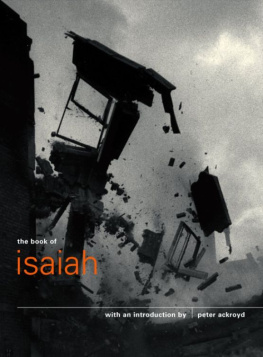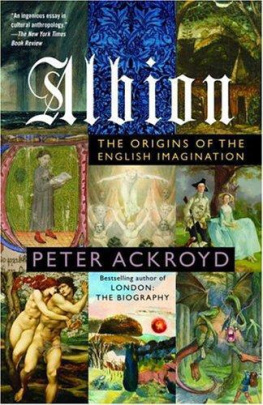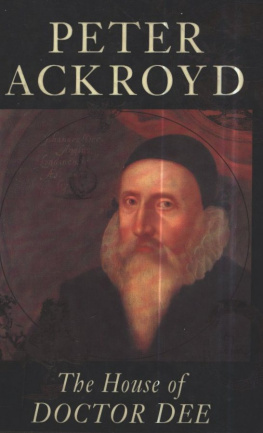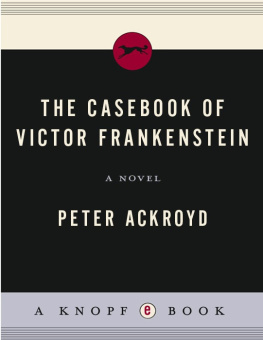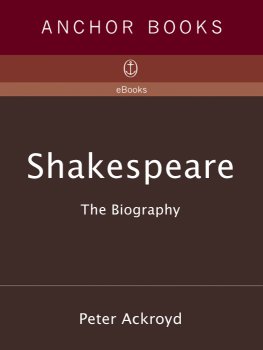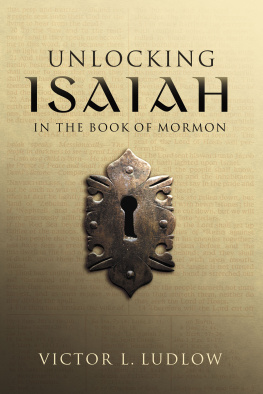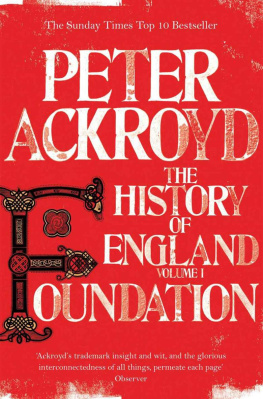Peter Ackroyd - The Book of the Prophet Isaiah
Here you can read online Peter Ackroyd - The Book of the Prophet Isaiah full text of the book (entire story) in english for free. Download pdf and epub, get meaning, cover and reviews about this ebook. year: 1999, publisher: Canongate Books, genre: Science. Description of the work, (preface) as well as reviews are available. Best literature library LitArk.com created for fans of good reading and offers a wide selection of genres:
Romance novel
Science fiction
Adventure
Detective
Science
History
Home and family
Prose
Art
Politics
Computer
Non-fiction
Religion
Business
Children
Humor
Choose a favorite category and find really read worthwhile books. Enjoy immersion in the world of imagination, feel the emotions of the characters or learn something new for yourself, make an fascinating discovery.
- Book:The Book of the Prophet Isaiah
- Author:
- Publisher:Canongate Books
- Genre:
- Year:1999
- Rating:3 / 5
- Favourites:Add to favourites
- Your mark:
- 60
- 1
- 2
- 3
- 4
- 5
The Book of the Prophet Isaiah: summary, description and annotation
We offer to read an annotation, description, summary or preface (depends on what the author of the book "The Book of the Prophet Isaiah" wrote himself). If you haven't found the necessary information about the book — write in the comments, we will try to find it.
This is the text of the book of Isaiah, the first and foremost of the 17 prophetic books of the Old Testament. Contrasting with images of wrath and destruction are visions of an age of peace and harmony. The biblical text is introduced by Peter Ackroyd.
The Book of the Prophet Isaiah — read online for free the complete book (whole text) full work
Below is the text of the book, divided by pages. System saving the place of the last page read, allows you to conveniently read the book "The Book of the Prophet Isaiah" online for free, without having to search again every time where you left off. Put a bookmark, and you can go to the page where you finished reading at any time.
Font size:
Interval:
Bookmark:
He lives in London. We must approach this sacred text with great respect, doubting the ability of our mind to comprehend it and of our tongue to describe it. The book of Isaiah is not the work of one writer or one prophet but, like the Homeric epics, incorporates the voices of many authors in a tradition of oral poetry. Yet even though it comprises various sources its shape, like a river made out of many streams, is fluent and harmonious. Within its 66 chapters passages of lyrical melody are pressed up against words of prophetic force, moments of vision vouchsafed beside occasions for denunciation; the narrative combines stories, poems, descriptions, revelations and lamentations. It is, in little, representative of the Bible itself. The origins of the various texts, original or interpolated, date variously from the eighth to the sixth century BCE.
Yet in a book where history and poetry mingle, for devotional or ritual purposes, there is no need to attempt to locate a substratum of real or observable fact; just as the original documents have long since crumbled to dust, so we cannot sift the episodes concerning forgotten battles and distant kings. The composition of the book itself is more certain chapters 1 to 39 are the work of several authors, but all moving within a realm concerning prophecies of redemption as well as fierce polemic against pagan idolaters and the profligate among the Lords own people. The 40th chapter marks the beginning of the work of the Deutero-Isaiah, perhaps the single most eloquent and inspiring of all the biblical writers who within 15 verses offers a vision of hope and of redemption for the people of Israel at the same time as, in a magnificent panegyric, he launches an attack upon Babylon and all the powers of this world. The third part, verses 55 to 66, acts as a coda to the first two sections, where interpolated hands have provided passages of prophecy and eschatology. Harmony itself is achieved through the introduction of very clear formal preoccupations, together with an abiding and overriding concern for rhetorical elaboration and amplitude. Scholars of the Hebrew text, for example, have enumerated instances of alliteration and onomatopoeia designed expressly to lift a cadence or emphasise a phrase.
The construction of the phrase itself is of the utmost significance, where simplicity and force work together in unison. That is why some of the lines from Isaiah have entered folk memory beyond the tribes of Israel and they shall beat their swords into plowshares (2:4) For unto us a child is born, unto us a son is given (9:6) The wolf also shall dwell with the lamb, and the leopard shall lie down with the kid (11:6) How art thou fallen from heaven, O Lucifer, son of the morning! (14:12) Let us eat and drink; for tomorrow we shall die (22:13) All flesh is grass (40:6) There is no peace, saith my God, to the wicked (57:21) No rest for the wicked. The provenance of some of these phrases is disputed as not springing from the lips of the historical Isaiah, but their relevance and influence are not in dispute. These are words which have literally changed the consciousness of the world. Yet they are important, too, in maintaining the urgency and relevance of a narrative which speaks to many nations concerning the central aspirations of humankind. That is also why the economy and brevity of Isaiah allow a single phrase to denote the passage of many years or the history of one city.
The utter simplicity of the authors voice emerges in passages of perfect pitch and power Then shalt thou call [upon the Lord] and he shall say, Here I am. (58:9). Here I am. It is as if the whole world resounded with Gods voice, and we may recall here William Blakes visionary conversation with Isaiah I saw no God nor heard any, the prophet informed the poet, in a finite organical perception; but my senses discoverd the infinite in everything. This in fact is one of the glories of Isaiah, where the grandeur or ineffability of the infinite is expressed in terms of a local landscape or a specific activity, so that the burden of the valley of vision (22:1) can be carried by details of weaving or of threshing. Here the aspiration towards the infinite and the illimitable is combined with a very clear and articulate presentation of contemporary realities.
Israel is a lodge in a garden of cucumbers (1:8), and the Lord tells Isaiah to walk towards the end of the conduit of the upper pool in the highway of the fullers field (7:3). The Lord shall tread down Moab even as straw is trodden down for the dunghill (25:10) and will put forth his hands as he that swimmeth spreadeth forth his hands to swim (25:11). Isaiah celebrates a universe in which the particulars of the social and natural world are revealed as tokens of spiritual activity, where world and spirit do indeed become one, like the swimmer, in a living pulse of energy for the earth shall be full of the knowledge of the Lord, as the waters cover the sea (11:9). The economy of effect, together with the use of repetition, renders these sacred verses not unlike the texts of Anglo-Saxon poetry or, indeed, the expression of any bardic people. The recitation may even have been accompanied by music, so that the whole narrative becomes a kind of performance in which the aspirations of both orator and audience alike are embodied. No one can ignore, either, the dramatic aspects of Isaiah where, for example, the anonymous author proclaims the fate of one unhappy man He is despised and rejected of men; a man of sorrows, and acquainted with grief (53:3).
This has often been characterised as a prophecy of Christs passion, yet it is more appropriately and less anachronistically seen as a most dramatic and human revelation of the outcast. In that sense, like the rest of Isaiah, it becomes a story of universal significance rather than a sample of pre-Christian revelation. There has been much discussion, in recent years, of the Bible as a literary rather than a sacred or historical text. Certainly the narrative devices are clear, with affiliations to western poetry and fiction. There is, for example, satire approaching an almost Swiftian vision of disgust at the flesh, in the description of the women of Zion with stretched forth necks and wanton eyes, walking and mincing as they go, and making a tinkling with their feet (3:16), or in the depiction of the priests of Ephraim so drunk that all tables are full of vomit and filthiness (28:8). But there are other forms of narrative in place here, as mysterious and as melodious as anything in epic poetry And the posts of the door moved at the voice of him that cried, and the house was filled with smoke (6:4).
Font size:
Interval:
Bookmark:
Similar books «The Book of the Prophet Isaiah»
Look at similar books to The Book of the Prophet Isaiah. We have selected literature similar in name and meaning in the hope of providing readers with more options to find new, interesting, not yet read works.
Discussion, reviews of the book The Book of the Prophet Isaiah and just readers' own opinions. Leave your comments, write what you think about the work, its meaning or the main characters. Specify what exactly you liked and what you didn't like, and why you think so.

